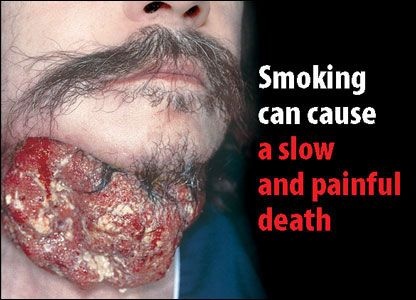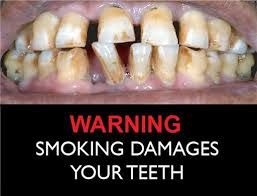If you smoke, you already know you need to quit. It’s bad for your heart, lungs, brain, and even your sex life.

Heart disease
Smokers in their thirties and forties have a heart attack rate that is five times higher than their nonsmoking peers. Cigarette smoking may be directly responsible for at least 20% of all deaths from heart disease, or about 120,000 deaths annually. Smoking cigars may also increase the risk of early death from heart disease, although evidence is much stronger for cigarette smoking.
Cancer
Smoking is the cause of 85% of all cases of lung cancer in 2000, account for 28% of all cancer deaths. Quitting reduces the risk for lung cancer, even well into middle age.
Smoking and smokeless tobacco also cause between 60% and 93% of cancers of the throat, mouth, and oesophagus. Smokers also have higher rates of leukaemia and cancers of the kidney, stomach, bladder, and pancreas. About 30% of cervical cancers have been attributed to both active and passive smoking. Lung cancer patients who survive and continue to smoke face a serious risk of developing a second tobacco-related tumour within ten years.

Smoking and Cancer
Smoking can cause cancer almost anywhere in your body:
-
Bladder
-
Blood (acute myeloid leukemia)
-
Cervix
-
Colon and rectum (colorectal)
-
Esophagus
-
Kidney and ureter
-
Larynx
-
Liver
-
Oropharynx (includes parts of the throat, tongue, soft palate, and the tonsils)
-
Pancreas
-
Stomach
-
Trachea, bronchus, and lung
If nobody smoked, one of every three cancer deaths in the United States would not happen.1,2Smoking increases the risk of dying from cancer and other diseases in cancer patients and survivors.
Female infertility and pregnancy:
Studies have now linked cigarette smoking to many reproductive problems. Women who smoke pose a greater danger not only to their own reproductive health but, if they smoke during pregnancy, to their unborn child. Some of these risks include the following:
Greater risk for infertility in women.
Greater risk for ectopic pregnancy and miscarriage.
Greater risk for stillbirth, prematurity, and low-birth weight.
Smoking reduces folate levels, a B vitamin that is important for preventing birth defects.
Women who smoke may pass genetic mutations that increase cancer risks to their unborn babies.
Male sexuality and reproduction
Men's sexual and reproductive health is not immune from the effects of smoking.
Heavy smoking is frequently cited as a contributory factor in impotence because it decreases the amount of blood flowing into the penis.
Smoking also reduces sperm density and their motility, increasing the risk for infertility.
Behavioural and Social Problems
Children of smoking mothers are more likely to have more motor control problems, perception impairments, attention disabilities, and social problems than children of non-smoking mothers. Some reasons for these associations have been suggested:
Women who breast feed and smoke pass nicotine by-products to their babies, which may contribute to these problems.
Women smokers tend to be less educated than women non-smokers, which may cause increased stress at home.
Smoking mothers and their children may share certain inherited psychologic factors, such as depression, which cause addictive and behavioural problems that are unrelated to smoking itself.
Effects on bones and joints
Smoking has many negative effects on bones and joints:
Smoking impairs formation of new bone and women who smoke are at high risk for osteoporosis.
Postmenopausal women who smoke have 17% greater risk for hip fracture at age 60, a 41% greater risk at 70, and a 108% greater risk at age 90.
Smokers are more apt to develop degenerative disorders and injuries in the spine.
Smokers have more trouble recovering from spinal surgery.
Smokers whose jobs involve lifting heavy objects are more likely to develop low back pain than non-smokers.
In women, smoking may also pose a small increased risk for developing rheumatoid arthritis

Effects of smoking on the sexual organs
The effects of tobacco smoke on the male body include an increased risk for:
-
lower sperm count
-
higher percentage of deformed sperm
-
genetic damage to sperm
-
impotence, which may be due to the effects of smoking on blood flow and damage to the blood vessels of the penis.
The effects of tobacco smoke on the female body include:
-
reduced fertility
-
menstrual cycle irregularities or absence of menstruation
-
menopause reached one or two years earlier
-
increased risk of cancer of the cervix
greatly increased risk of stroke and heart attack if the smoker is aged over 35 years and taking the oral contraceptive pill.
Effects of smoking on babies
The effects of maternal smoking on an unborn baby include:
-
increased risk of miscarriage, stillbirth and premature birth
-
low birth weight, which may have a lasting effect of the growth and development of children. Low birth weight is associated with an increased risk of heart disease, stroke, high blood pressure, being overweight and diabetes in adulthood
-
increased risk of cleft palate and cleft lip
-
paternal smoking can also harm the fetus if the non-smoking mother is exposed to second-hand smoke.
If a parent continues to smoke during their baby’s first year of life, the child has an increased risk of ear infections, respiratory illnesses such as pneumonia and bronchitis, sudden infant death syndrome (SIDS) and meningococcal disease.
Thank you
-





